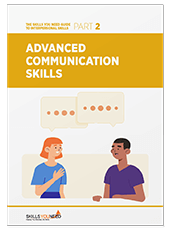The Best Interpersonal Skills for the Job Market This Year
– Do You Have Them?
Interpersonal skills are one of the key things that candidates are judged on during the recruitment process. Also known as soft skills, they’re incredibly important, both in life generally, and especially in professional environments.
Interpersonal skills are what employers will judge to estimate how well an individual will fit into a company’s culture, and will be central to success in most job markets.
In this article, we speak to leading DBS Checks provider Personnel Checks and take a look at some of the most important interpersonal skills for the job market this year, so you can see if you have them and, if you don’t, work on developing them.
Communication
This is the most talked about soft skill, and certainly one of the most important ones. No matter what industry you’re in, it’s imperative that you’re able to communicate with others.
Even those working in more independent roles, such as writers and developers, still need to be able to discuss client needs, or to discuss ongoing developments with quality control and editors. Recruiters will judge an applicant’s ability to communicate, so if you think it’s a weak point, it's certainly something you should pay attention to.
Active listening
This is the unspoken side of communication; knowing when to be quiet, and actively listen to the concerns and thoughts of clients and colleagues.
Active listening is absolutely a skill that can be developed, with relatively little effort. Asking specific questions based on what you’re hearing shows that you’re paying attention, and care about the matter at hand. Active listening helps people feel heard, and makes them feel valued, lets them know that their concerns matter.
Teamwork
Teamwork covers a broad set of skills that will be important for most roles. It includes communication of course, but also a host of other skills such as conflict resolution, task delegation, and time management. It’s an important skill for managers to have, but not just managers. Teams work best when each member can take control of a task, and doesn’t need to be micro-managed by an authoritative figure.
The skills listed above will help you to thrive in a team environment, making you a more attractive candidate for most roles in the process.
Empathy
Being able to read the room, to read how a client or colleague is feeling, is incredibly important. Part of it is down to being a good listener, but an appreciation for a wider range of social cues is also a must. Empathy can’t be taught, but it’s possible to change the way we respond to social situations to show that we understand them.
Expressing compassion for issues is an important skill, especially for managers, who will likely have team members coming to them regularly for support and advice. It’s one of the more abstract soft skills, but also one of the most important ones.
Managing conflict
The ability to resolve conflicts, when they occur, can be a massively beneficial skill to bring to an organisation. It doesn’t matter whether you’re in a managerial position or not, having the skills that enable you to pacify situations and make everyone feel heard will take you a long way in a lot of careers.
Conflicts aren’t always massive, loud confrontations either; a good conflict resolver will spot when tension is rising before it gets to that point and pour cold water onto the hot coals. Conflict resolution involves several of the soft skills mentioned above of course; you need to be able to listen, and also communicate between individuals who are likely unable or unwilling to hear their opponent’s point of view.
Positive reinforcement
No matter the position you’re in, there will likely be occasions where those around you need building up, requiring a little more encouragement to do their job to the best of their ability. Knowing how to use positive reinforcement is a subtle skill; it’s easy to appear patronising, and each person responds to praise in a slightly different way.
You need to be able to read people well, to understand what incentivises them, what kind of language makes them tick, in order to enact effective positive reinforcement.
Positivity
Employers, on the whole, want the workplace to be a positive environment. This doesn’t mean that you should go around telling jokes all the time, or be someone who you’re not. It does mean that you should make an effort to contribute to the atmosphere of the workplace, to participate in the culture. Employers want someone who will be part of the team, and that often means more than just showing up every day.
Openness to feedback
Employers will want to see how you respond to criticism. To develop professionally, you need to be open to being criticised – constructively, of course. If you get overly defensive, or fight every suggestion that’s made about your work, you’ll likely be difficult to manage, and won’t respond well to feedback.
This can be a difficult personality trait to change, but it’s certainly something that can be worked on. Try to spot patterns in your emotional response to criticism, especially when you feel your emotions rising. Remembering that criticism of your work isn’t an attack on you as a person is one of the most effective ways of becoming open to feedback.
Professionalism
Professionalism is quite a broad category, but it’s absolutely imperative for most positions. It means turning up on time, learning how to treat various members of staff, checking your posture, and a plethora of other micro-adjustments to your behaviour.
It’s something that you can constantly work on and should pay special attention to on those days when you’re not quite feeling like being at work. Showing grace in the face of adversity will be noticed and appreciated by your superiors, so make an effort, no matter how hard it is in the moment!
Further Reading from Skills You Need
The Skills You Need Guide to Interpersonal Skills eBooks.
Develop your interpersonal skills with our series of eBooks. Learn about and improve your communication skills, tackle conflict resolution, mediate in difficult situations, and develop your emotional intelligence.

About the Author
James Parkinson is Head of Marketing Content at Personnel Checks, the UK’s highest rated background screening company providing fast and affordable DBS checks for employers.



